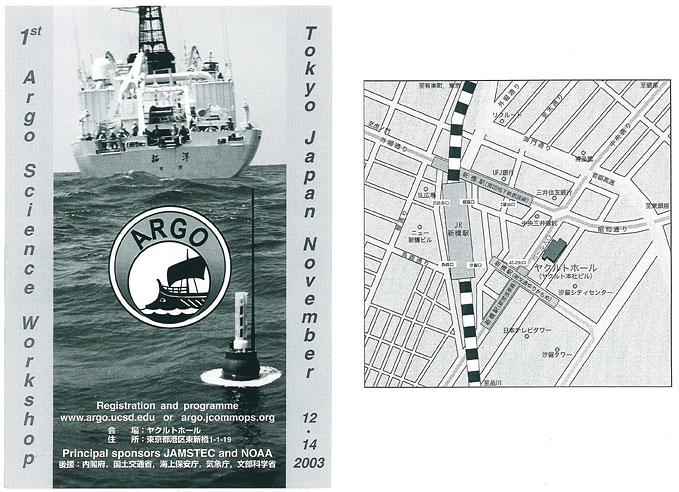| 0930 - 1000 |
Introduction to workshop |
Roemmich/Takeuchi |
| 1000 - 1015 |
Argo background |
Gould/Belbeoch |
| 1015 - 1040 |
Argo and climate science |
Hanawa |
| |
|
|
| 1040 - 1100 |
Coffee |
|
| |
|
|
| 1100 - 1125 |
Argo and GODAE |
Le Traon |
| 1125 - 1150 |
Argo Float Technology: Achievements and Challenges |
Riser |
| 1150 - 1215 |
The Argo data system |
Keeley/Pouliquen |
| |
|
|
| 1215 - 1345 |
Lunch |
|
| |
|
|
| 1345 - 1545 |
Poster session and coffee |
|
| |
|
|
| 1545 - 1610 |
How good are Argo DM data (Provisional title) |
Wong |
| 1610 - 1630 |
Design Requirements for an ARGO Float Array in the Indian Ocean
Inferred from Observing System Simulation Experiments |
Schiller (Australia) |
| 1630 - 1645 |
Experience of DM QC for the Atlantic |
Desaubies (France) |
| 1645 - 1700 |
New Pacific historical dataset for the Argo standard scheme of
delayed-mode quality control and its performance of salinity correction |
Kabayashi (Japan) |
| 1700 - 1715 |
Float to float drift intercomparison in an intermediate current
regime |
Machin (Spain) |
| 1715 - 1730 |
A Comparison of Profiling Float and Expendable Bathythermograph
Representations of Upper Layer Temperature Structure in the Northwestern
Subtropical North Atlantic |
Molinari (USA) |
| 0930 - 0955 |
The impact of Argo data on ocean and climate forecasting |
Matt Martin |
| 0955 - 1010 |
Ocean State Estimation by 4D-VAR Data Assimilation using ARGO
Data |
Masuda (Japan) |
| 1010 - 1025 |
A regional model assimilating ARGO, XBT, and altimeter data in
the central North Pacific. |
Cornuelle (USA) |
| 1025 - 1040 |
Assimilating S(T) from ARGO |
Haines (UK) |
| 1040 - 1105 |
Argo Impact Experiment with a JMA ENSO Forecast Model |
Kitamura (Japan) |
| |
|
|
| 1105 - 1125 |
Coffee |
|
| |
|
|
| 1125 - 1150 |
Argo’s role in closing the oceanic heat and freshwater
budgets |
Roemmich |
| 1150 - 1205 |
World Ocean heat content, 1955-1999 |
Levitus (USA) |
| 1205 - 1220 |
Upper ocean response before and after the cyclone from Argo floats |
Ravichandran (India) |
| 1220 - 1235 |
The decreasing of Sea Surface Salinity (SSS) by Typhoon in the
Summer of 2002 and 2003 in the northwestern Pacific |
Xu (China) |
| 1235 - 1250 |
Lagrangian Observations of the Mode Water Formation in the North
Pacific |
Suga (Japan) |
| 1250 - 1305 |
New estimates of the heat budget in the Tropical Atlantic, first
results. |
Schmid (USA) |
| |
|
|
| 1305 - 1400 |
Lunch |
|
| |
|
|
| 1400 - 1600 |
Poster session and coffee |
|
| |
|
|
| 1600 - 1625 |
Subsurface theta/S (provisional title) |
King |
| 1625 - 1640 |
Observations of N. Atlantic Subtropical Mode Water using Profiling
Floats |
Kwon (USA) |
| 1640 - 1655 |
Formation region of North Pacific Subtropical Mode Water in the
late winter of 2003 |
Oka (Japan) |
| 1655 - 1710 |
Winter conditions in the Irminger Sea revealed by Argo floats |
Centurioni (USA) |
| 1710 - 1725 |
Structure and Variability of the Indian Ocean as revealed from
ARGO observations |
Raghavan (India) |
| 1725 - 1740 |
A Preliminary Study of Mesoscale Eddy effects on the Formation
of the North Pacific Subtropical Mode Water |
Pan (China) |
| 1740 - 1755 |
Potential of Argo data for detection and attribution of oceanic
climate change |
Wood (UK) |
| 1755 - 1805 |
Salinity change in the southeastern Indian Ocean |
Phillips (Australia) |
| 0930 - 1005 |
Seasonal/interannual and short-lived events (provisional
title) |
Freeland |
| 1005 - 1020 |
The Bering slope current system revisited |
Johnson (USA |
| 1020 - 1035 |
Eddy-Induced Temperature Anomalies in the Kuroshio Extension Recirculation
Gyre From Argo, TMI and Altimetry Measurements |
Bo Qiu (USA) |
| |
|
|
| 1050 - 1110 |
Coffee |
|
| |
|
|
| 1110 - 1135 |
Estimating ocean velocity fields from Argo and other data
(Provisional title) |
Owens |
| 1135 - 1150 |
Intermediate level circulation in the southwestern part of the
Japan/East Sea |
Park (Korea) |
| 1150 - 1205 |
The Absolute Geostrophic Velocity Field and Wintertime Convection
in the Japan/East Sea Estimated from an Array of Profiling Floats |
Riser (USA) |
| 1205 - 1220 |
New elements of the Japan Sea oceanography found with the use
of profiling floats |
Danchenkov (Russia) |
| 1220 - 1235 |
Global Statistics of inertial motions from ARGO float |
Kuh Kim (Korea) |
| 1235 - 1250 |
Response of the Arabian Sea to the summer monsoons of 2002 and
2003 |
Vinayachandran (India) |
| 1250 - 1305 |
Observations of the Okhotsk Sea Circulation and Water Masses Using
Profiling Floats |
Oshima et al (Japan)
Riser (USA) presents |
| |
|
|
| 1300 - 1400 |
Lunch |
|
| |
|
|
| 1400 - 1530 |
Round table discussion - Improving Argo and its science |
|
| |
|
|
| 1530 - 1550 |
Coffee |
|
| |
|
|
| 1550 - 1605 |
Argo as an Aid to Environmental Monitoring and Assessment in the
Gulf of Alaska |
Freeland (Canada) |
| 1605 - 1630 |
Argo making a difference |
Radhakrishnan (India) |
| 1630 - 1645 |
Ending |
|

